Catholic Social Thought: Principles, Applications, and Analysis
VerifiedAdded on 2022/09/22
|6
|1570
|20
Essay
AI Summary
This essay delves into Catholic Social Thought, a system of Christian beliefs and doctrines focusing on human dignity and the common good. It examines key principles such as the dignity of the human person, the common good of society, the preferential option for the poor, subsidiarity, and the universal purpose of goods. The essay discusses each principle, illustrating their relevance and application in contemporary society, with examples like community initiatives and the importance of respecting individual rights. It also highlights the historical context and the ongoing relevance of these teachings in addressing social issues and promoting justice. The essay concludes by emphasizing the role of religious beliefs in shaping moral ideals and administrative relevance, ultimately aiming for the betterment of society and the protection of human rights.
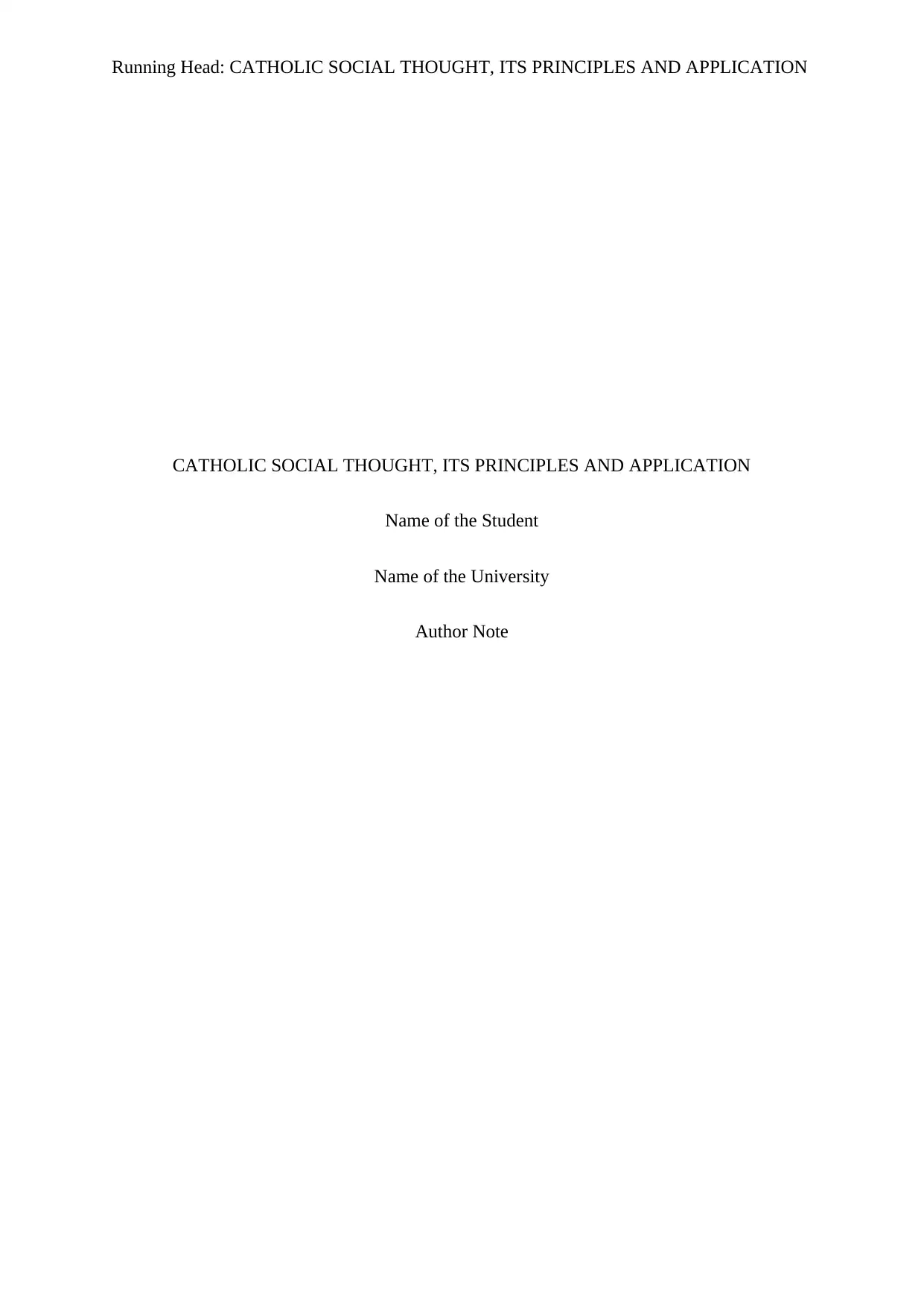
Running Head: CATHOLIC SOCIAL THOUGHT, ITS PRINCIPLES AND APPLICATION
CATHOLIC SOCIAL THOUGHT, ITS PRINCIPLES AND APPLICATION
Name of the Student
Name of the University
Author Note
CATHOLIC SOCIAL THOUGHT, ITS PRINCIPLES AND APPLICATION
Name of the Student
Name of the University
Author Note
Paraphrase This Document
Need a fresh take? Get an instant paraphrase of this document with our AI Paraphraser
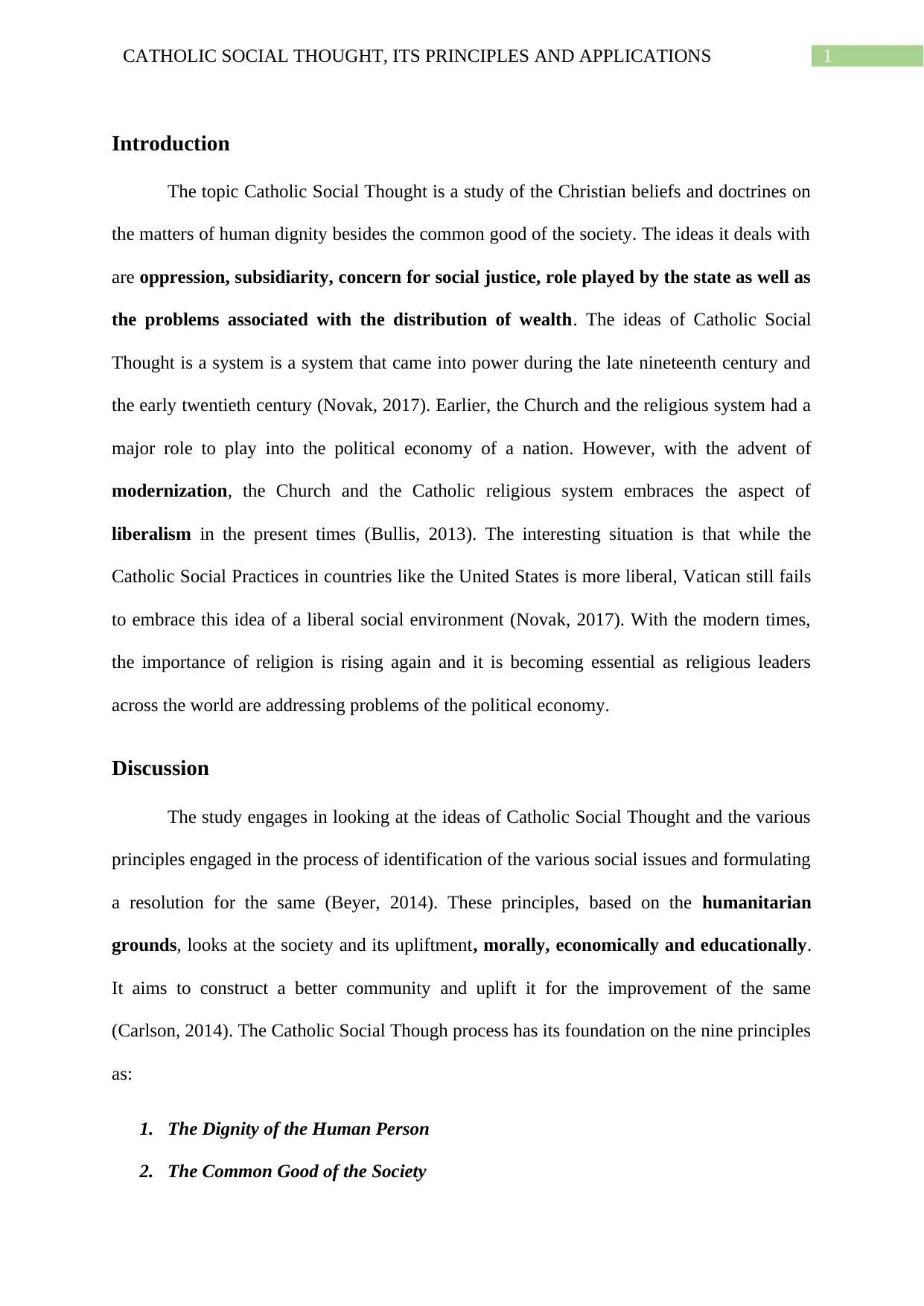
1CATHOLIC SOCIAL THOUGHT, ITS PRINCIPLES AND APPLICATIONS
Introduction
The topic Catholic Social Thought is a study of the Christian beliefs and doctrines on
the matters of human dignity besides the common good of the society. The ideas it deals with
are oppression, subsidiarity, concern for social justice, role played by the state as well as
the problems associated with the distribution of wealth. The ideas of Catholic Social
Thought is a system is a system that came into power during the late nineteenth century and
the early twentieth century (Novak, 2017). Earlier, the Church and the religious system had a
major role to play into the political economy of a nation. However, with the advent of
modernization, the Church and the Catholic religious system embraces the aspect of
liberalism in the present times (Bullis, 2013). The interesting situation is that while the
Catholic Social Practices in countries like the United States is more liberal, Vatican still fails
to embrace this idea of a liberal social environment (Novak, 2017). With the modern times,
the importance of religion is rising again and it is becoming essential as religious leaders
across the world are addressing problems of the political economy.
Discussion
The study engages in looking at the ideas of Catholic Social Thought and the various
principles engaged in the process of identification of the various social issues and formulating
a resolution for the same (Beyer, 2014). These principles, based on the humanitarian
grounds, looks at the society and its upliftment, morally, economically and educationally.
It aims to construct a better community and uplift it for the improvement of the same
(Carlson, 2014). The Catholic Social Though process has its foundation on the nine principles
as:
1. The Dignity of the Human Person
2. The Common Good of the Society
Introduction
The topic Catholic Social Thought is a study of the Christian beliefs and doctrines on
the matters of human dignity besides the common good of the society. The ideas it deals with
are oppression, subsidiarity, concern for social justice, role played by the state as well as
the problems associated with the distribution of wealth. The ideas of Catholic Social
Thought is a system is a system that came into power during the late nineteenth century and
the early twentieth century (Novak, 2017). Earlier, the Church and the religious system had a
major role to play into the political economy of a nation. However, with the advent of
modernization, the Church and the Catholic religious system embraces the aspect of
liberalism in the present times (Bullis, 2013). The interesting situation is that while the
Catholic Social Practices in countries like the United States is more liberal, Vatican still fails
to embrace this idea of a liberal social environment (Novak, 2017). With the modern times,
the importance of religion is rising again and it is becoming essential as religious leaders
across the world are addressing problems of the political economy.
Discussion
The study engages in looking at the ideas of Catholic Social Thought and the various
principles engaged in the process of identification of the various social issues and formulating
a resolution for the same (Beyer, 2014). These principles, based on the humanitarian
grounds, looks at the society and its upliftment, morally, economically and educationally.
It aims to construct a better community and uplift it for the improvement of the same
(Carlson, 2014). The Catholic Social Though process has its foundation on the nine principles
as:
1. The Dignity of the Human Person
2. The Common Good of the Society
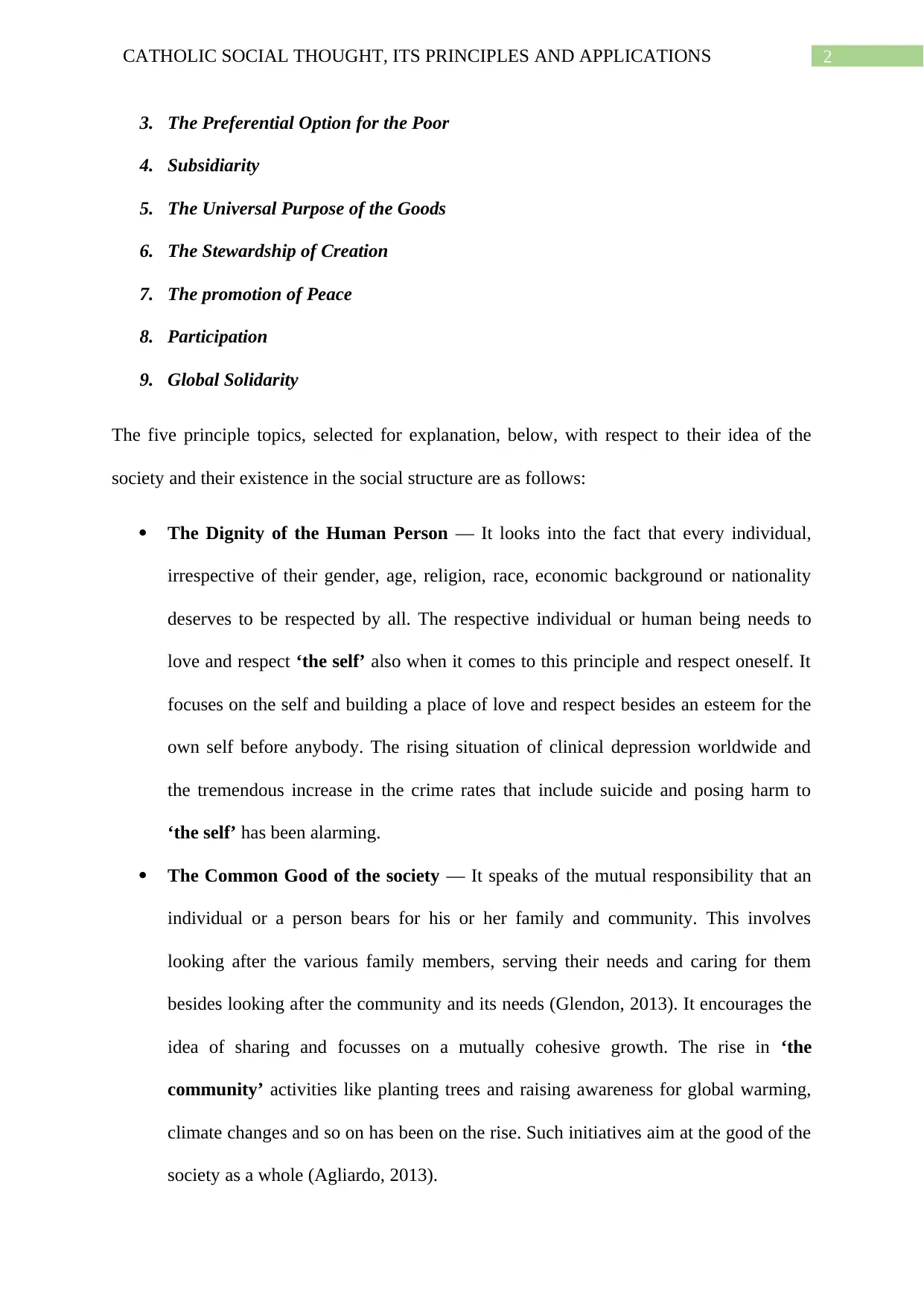
2CATHOLIC SOCIAL THOUGHT, ITS PRINCIPLES AND APPLICATIONS
3. The Preferential Option for the Poor
4. Subsidiarity
5. The Universal Purpose of the Goods
6. The Stewardship of Creation
7. The promotion of Peace
8. Participation
9. Global Solidarity
The five principle topics, selected for explanation, below, with respect to their idea of the
society and their existence in the social structure are as follows:
The Dignity of the Human Person — It looks into the fact that every individual,
irrespective of their gender, age, religion, race, economic background or nationality
deserves to be respected by all. The respective individual or human being needs to
love and respect ‘the self’ also when it comes to this principle and respect oneself. It
focuses on the self and building a place of love and respect besides an esteem for the
own self before anybody. The rising situation of clinical depression worldwide and
the tremendous increase in the crime rates that include suicide and posing harm to
‘the self’ has been alarming.
The Common Good of the society — It speaks of the mutual responsibility that an
individual or a person bears for his or her family and community. This involves
looking after the various family members, serving their needs and caring for them
besides looking after the community and its needs (Glendon, 2013). It encourages the
idea of sharing and focusses on a mutually cohesive growth. The rise in ‘the
community’ activities like planting trees and raising awareness for global warming,
climate changes and so on has been on the rise. Such initiatives aim at the good of the
society as a whole (Agliardo, 2013).
3. The Preferential Option for the Poor
4. Subsidiarity
5. The Universal Purpose of the Goods
6. The Stewardship of Creation
7. The promotion of Peace
8. Participation
9. Global Solidarity
The five principle topics, selected for explanation, below, with respect to their idea of the
society and their existence in the social structure are as follows:
The Dignity of the Human Person — It looks into the fact that every individual,
irrespective of their gender, age, religion, race, economic background or nationality
deserves to be respected by all. The respective individual or human being needs to
love and respect ‘the self’ also when it comes to this principle and respect oneself. It
focuses on the self and building a place of love and respect besides an esteem for the
own self before anybody. The rising situation of clinical depression worldwide and
the tremendous increase in the crime rates that include suicide and posing harm to
‘the self’ has been alarming.
The Common Good of the society — It speaks of the mutual responsibility that an
individual or a person bears for his or her family and community. This involves
looking after the various family members, serving their needs and caring for them
besides looking after the community and its needs (Glendon, 2013). It encourages the
idea of sharing and focusses on a mutually cohesive growth. The rise in ‘the
community’ activities like planting trees and raising awareness for global warming,
climate changes and so on has been on the rise. Such initiatives aim at the good of the
society as a whole (Agliardo, 2013).
⊘ This is a preview!⊘
Do you want full access?
Subscribe today to unlock all pages.

Trusted by 1+ million students worldwide
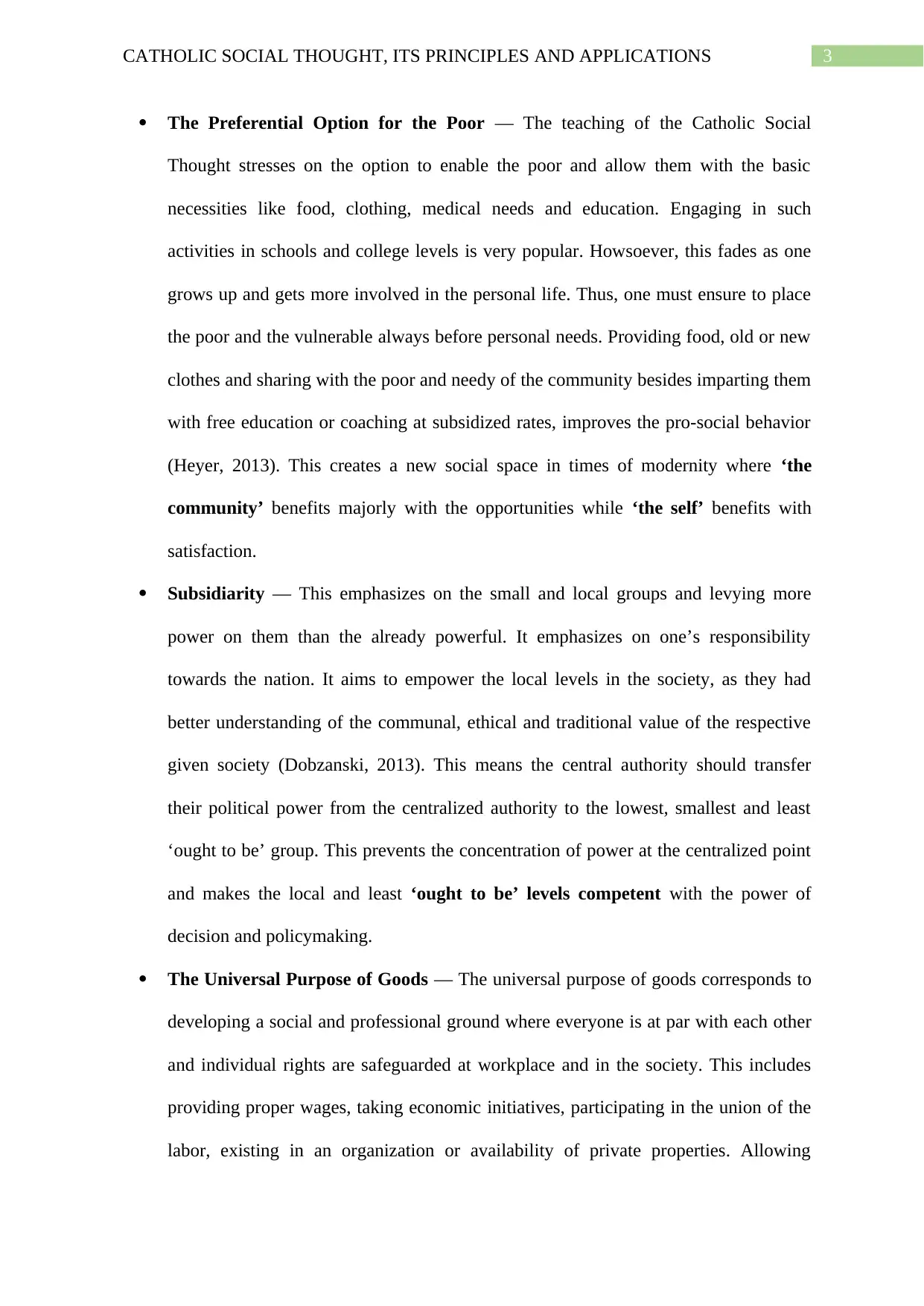
3CATHOLIC SOCIAL THOUGHT, ITS PRINCIPLES AND APPLICATIONS
The Preferential Option for the Poor — The teaching of the Catholic Social
Thought stresses on the option to enable the poor and allow them with the basic
necessities like food, clothing, medical needs and education. Engaging in such
activities in schools and college levels is very popular. Howsoever, this fades as one
grows up and gets more involved in the personal life. Thus, one must ensure to place
the poor and the vulnerable always before personal needs. Providing food, old or new
clothes and sharing with the poor and needy of the community besides imparting them
with free education or coaching at subsidized rates, improves the pro-social behavior
(Heyer, 2013). This creates a new social space in times of modernity where ‘the
community’ benefits majorly with the opportunities while ‘the self’ benefits with
satisfaction.
Subsidiarity — This emphasizes on the small and local groups and levying more
power on them than the already powerful. It emphasizes on one’s responsibility
towards the nation. It aims to empower the local levels in the society, as they had
better understanding of the communal, ethical and traditional value of the respective
given society (Dobzanski, 2013). This means the central authority should transfer
their political power from the centralized authority to the lowest, smallest and least
‘ought to be’ group. This prevents the concentration of power at the centralized point
and makes the local and least ‘ought to be’ levels competent with the power of
decision and policymaking.
The Universal Purpose of Goods — The universal purpose of goods corresponds to
developing a social and professional ground where everyone is at par with each other
and individual rights are safeguarded at workplace and in the society. This includes
providing proper wages, taking economic initiatives, participating in the union of the
labor, existing in an organization or availability of private properties. Allowing
The Preferential Option for the Poor — The teaching of the Catholic Social
Thought stresses on the option to enable the poor and allow them with the basic
necessities like food, clothing, medical needs and education. Engaging in such
activities in schools and college levels is very popular. Howsoever, this fades as one
grows up and gets more involved in the personal life. Thus, one must ensure to place
the poor and the vulnerable always before personal needs. Providing food, old or new
clothes and sharing with the poor and needy of the community besides imparting them
with free education or coaching at subsidized rates, improves the pro-social behavior
(Heyer, 2013). This creates a new social space in times of modernity where ‘the
community’ benefits majorly with the opportunities while ‘the self’ benefits with
satisfaction.
Subsidiarity — This emphasizes on the small and local groups and levying more
power on them than the already powerful. It emphasizes on one’s responsibility
towards the nation. It aims to empower the local levels in the society, as they had
better understanding of the communal, ethical and traditional value of the respective
given society (Dobzanski, 2013). This means the central authority should transfer
their political power from the centralized authority to the lowest, smallest and least
‘ought to be’ group. This prevents the concentration of power at the centralized point
and makes the local and least ‘ought to be’ levels competent with the power of
decision and policymaking.
The Universal Purpose of Goods — The universal purpose of goods corresponds to
developing a social and professional ground where everyone is at par with each other
and individual rights are safeguarded at workplace and in the society. This includes
providing proper wages, taking economic initiatives, participating in the union of the
labor, existing in an organization or availability of private properties. Allowing
Paraphrase This Document
Need a fresh take? Get an instant paraphrase of this document with our AI Paraphraser
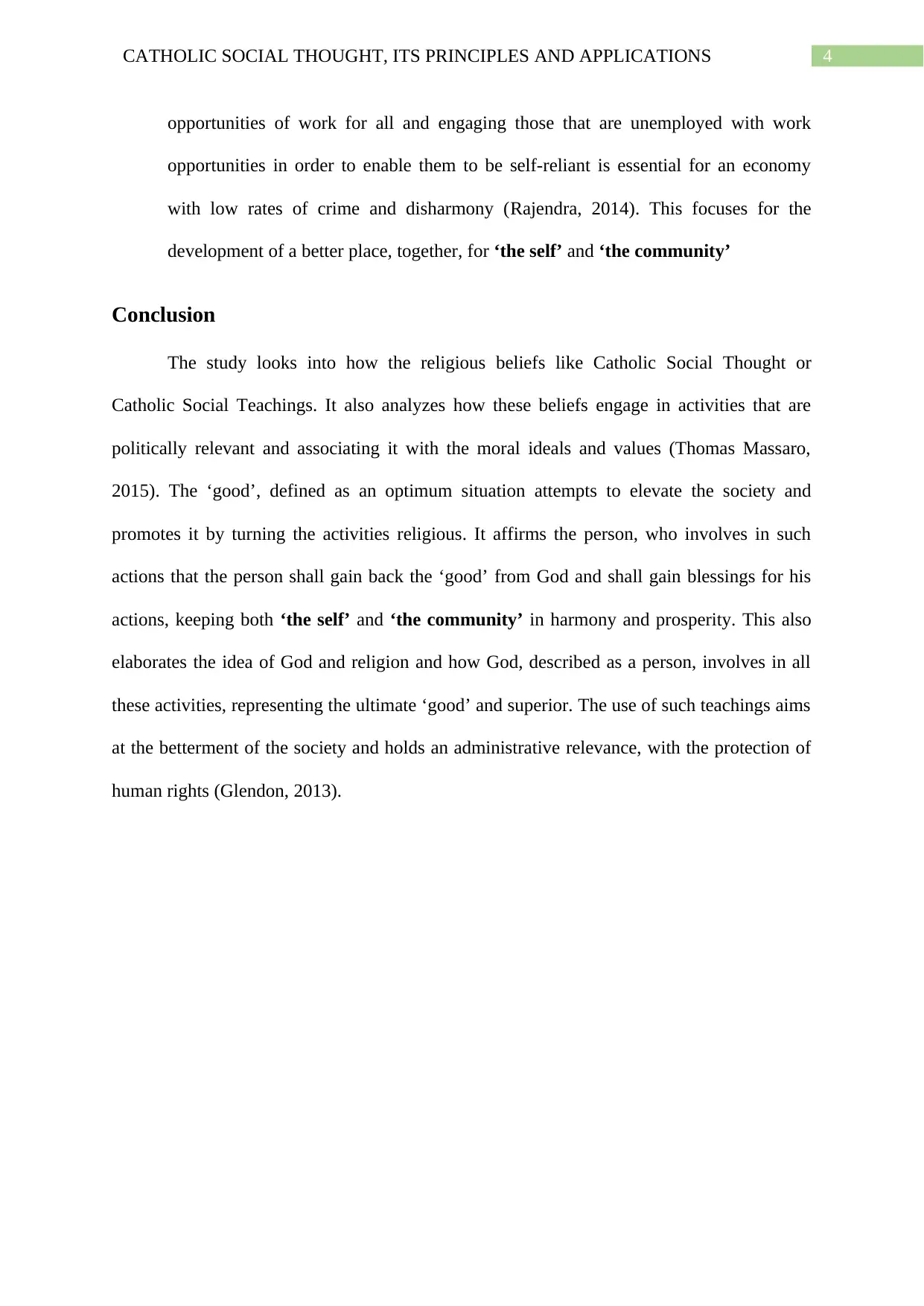
4CATHOLIC SOCIAL THOUGHT, ITS PRINCIPLES AND APPLICATIONS
opportunities of work for all and engaging those that are unemployed with work
opportunities in order to enable them to be self-reliant is essential for an economy
with low rates of crime and disharmony (Rajendra, 2014). This focuses for the
development of a better place, together, for ‘the self’ and ‘the community’
Conclusion
The study looks into how the religious beliefs like Catholic Social Thought or
Catholic Social Teachings. It also analyzes how these beliefs engage in activities that are
politically relevant and associating it with the moral ideals and values (Thomas Massaro,
2015). The ‘good’, defined as an optimum situation attempts to elevate the society and
promotes it by turning the activities religious. It affirms the person, who involves in such
actions that the person shall gain back the ‘good’ from God and shall gain blessings for his
actions, keeping both ‘the self’ and ‘the community’ in harmony and prosperity. This also
elaborates the idea of God and religion and how God, described as a person, involves in all
these activities, representing the ultimate ‘good’ and superior. The use of such teachings aims
at the betterment of the society and holds an administrative relevance, with the protection of
human rights (Glendon, 2013).
opportunities of work for all and engaging those that are unemployed with work
opportunities in order to enable them to be self-reliant is essential for an economy
with low rates of crime and disharmony (Rajendra, 2014). This focuses for the
development of a better place, together, for ‘the self’ and ‘the community’
Conclusion
The study looks into how the religious beliefs like Catholic Social Thought or
Catholic Social Teachings. It also analyzes how these beliefs engage in activities that are
politically relevant and associating it with the moral ideals and values (Thomas Massaro,
2015). The ‘good’, defined as an optimum situation attempts to elevate the society and
promotes it by turning the activities religious. It affirms the person, who involves in such
actions that the person shall gain back the ‘good’ from God and shall gain blessings for his
actions, keeping both ‘the self’ and ‘the community’ in harmony and prosperity. This also
elaborates the idea of God and religion and how God, described as a person, involves in all
these activities, representing the ultimate ‘good’ and superior. The use of such teachings aims
at the betterment of the society and holds an administrative relevance, with the protection of
human rights (Glendon, 2013).
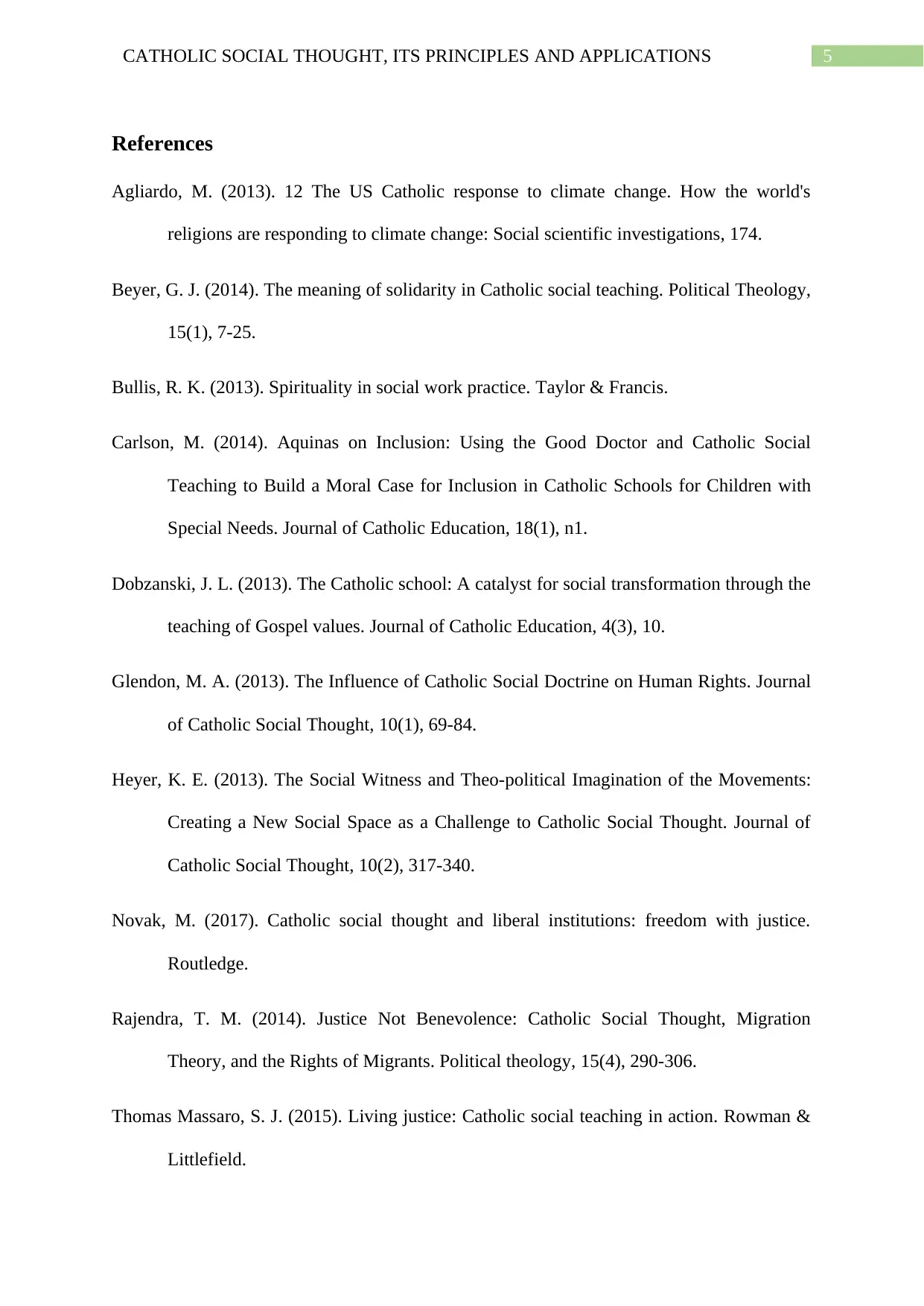
5CATHOLIC SOCIAL THOUGHT, ITS PRINCIPLES AND APPLICATIONS
References
Agliardo, M. (2013). 12 The US Catholic response to climate change. How the world's
religions are responding to climate change: Social scientific investigations, 174.
Beyer, G. J. (2014). The meaning of solidarity in Catholic social teaching. Political Theology,
15(1), 7-25.
Bullis, R. K. (2013). Spirituality in social work practice. Taylor & Francis.
Carlson, M. (2014). Aquinas on Inclusion: Using the Good Doctor and Catholic Social
Teaching to Build a Moral Case for Inclusion in Catholic Schools for Children with
Special Needs. Journal of Catholic Education, 18(1), n1.
Dobzanski, J. L. (2013). The Catholic school: A catalyst for social transformation through the
teaching of Gospel values. Journal of Catholic Education, 4(3), 10.
Glendon, M. A. (2013). The Influence of Catholic Social Doctrine on Human Rights. Journal
of Catholic Social Thought, 10(1), 69-84.
Heyer, K. E. (2013). The Social Witness and Theo-political Imagination of the Movements:
Creating a New Social Space as a Challenge to Catholic Social Thought. Journal of
Catholic Social Thought, 10(2), 317-340.
Novak, M. (2017). Catholic social thought and liberal institutions: freedom with justice.
Routledge.
Rajendra, T. M. (2014). Justice Not Benevolence: Catholic Social Thought, Migration
Theory, and the Rights of Migrants. Political theology, 15(4), 290-306.
Thomas Massaro, S. J. (2015). Living justice: Catholic social teaching in action. Rowman &
Littlefield.
References
Agliardo, M. (2013). 12 The US Catholic response to climate change. How the world's
religions are responding to climate change: Social scientific investigations, 174.
Beyer, G. J. (2014). The meaning of solidarity in Catholic social teaching. Political Theology,
15(1), 7-25.
Bullis, R. K. (2013). Spirituality in social work practice. Taylor & Francis.
Carlson, M. (2014). Aquinas on Inclusion: Using the Good Doctor and Catholic Social
Teaching to Build a Moral Case for Inclusion in Catholic Schools for Children with
Special Needs. Journal of Catholic Education, 18(1), n1.
Dobzanski, J. L. (2013). The Catholic school: A catalyst for social transformation through the
teaching of Gospel values. Journal of Catholic Education, 4(3), 10.
Glendon, M. A. (2013). The Influence of Catholic Social Doctrine on Human Rights. Journal
of Catholic Social Thought, 10(1), 69-84.
Heyer, K. E. (2013). The Social Witness and Theo-political Imagination of the Movements:
Creating a New Social Space as a Challenge to Catholic Social Thought. Journal of
Catholic Social Thought, 10(2), 317-340.
Novak, M. (2017). Catholic social thought and liberal institutions: freedom with justice.
Routledge.
Rajendra, T. M. (2014). Justice Not Benevolence: Catholic Social Thought, Migration
Theory, and the Rights of Migrants. Political theology, 15(4), 290-306.
Thomas Massaro, S. J. (2015). Living justice: Catholic social teaching in action. Rowman &
Littlefield.
⊘ This is a preview!⊘
Do you want full access?
Subscribe today to unlock all pages.

Trusted by 1+ million students worldwide
1 out of 6
Related Documents
Your All-in-One AI-Powered Toolkit for Academic Success.
+13062052269
info@desklib.com
Available 24*7 on WhatsApp / Email
![[object Object]](/_next/static/media/star-bottom.7253800d.svg)
Unlock your academic potential
Copyright © 2020–2026 A2Z Services. All Rights Reserved. Developed and managed by ZUCOL.



